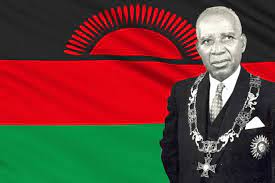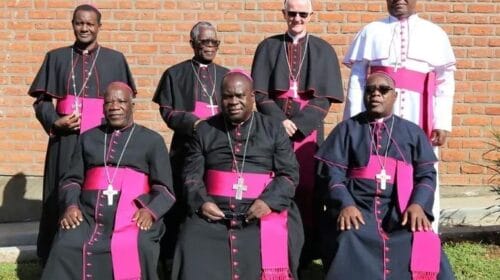Abba Kyari: A Friend Of The President Or An Enemy Of The People By Samuel Nwite
“Chief of Staff to the President, Mallam Abba Kyari, passes on. May God rest his soul. Amen. Funeral arrangements to be announced soon.”
With this announcement by Femi Adesina, Special Adviser on Media and Publicity to President Muhammadu Buhari, the Nigerian social media space was set on a blaze of conflicting reactions.
As condolence pour in from notable people, especially those with political affiliations, others embarked on messages that bear less of solicitude.
“Kobe Bryant who doesn’t have any ties to Nigeria died and almost everyone on Twitter Nigeria felt some genuine sense of sadness,” a Twitter user wrote. “But the Chief of Staff to the president of Nigeria is dead and a lot of Nigerians don’t give a sh*t. In short, be a proper human when you’re alive.”
He is not alone in expressing this sentiment, others followed with what sympathizers deemed rejoicing over the demise of a fellow human.
The Kano State Commissioner for Works and Infrastructure, Engr. Muazu Magaji took to his Facebook to express what he like so many others, feels for the late Kyari.
“Abba Kyari is no ordinary citizen, he amassed so much power that decide the fate of my nation and its people. Hence his death is never a personal death,” he wrote after Kyari’s death.
This followed other wishes when Kyari was still in sick bed, that tells of ill-feeling that resonates with so many people.
“Nigeria is bigger than any individual. While praying for the President’s late support staff…ours is to prevent a repeat of his non-accountable domineering era. May Allah heal Abba Kyari but may Allah not return him as Chief of Staff. PMB needs to be his own man,” Magaji wrote before the death of Kyari.
Though he has paid for the post with his job, as he was removed as commissioner by Kano State governor, Umar Ganduje, other lost nothing expressing how they feel about the late Chief of Staff.
The perceived celebration taking place over the death of a top government official defied the supposed eulogy for a man of his calibre.
Abba Kyari became Buhari’s Chief of Staff in 2015, following a record of scintillating career dating back to the early 80s.
Abba Kyari graduated with a bachelor’s degree in sociology from the University of Warwick in 1980, after which he got another degree from the University of Cambridge. In 1983, he was called to the bar after attending Nigerian Law School.
In 1984, he went back to the University of Cambridge to obtain a master’s degree in Law. He also attended the International Institute for Management Development in Lausanne, Switzerland, and was part of the Management Development at the Harvard Business School of 1992 and 1994.
Kyari returned to Nigeria at the end of his educational pursuit to secure some prominent jobs that put him on the spotlight for the position he last held.
Upon his return to Nigeria, he started work at the Fani-Kayode and Sowemimo law firm where he spent a few years before he moved on to the job of Editor of the New Africa Holdings Limited Kaduna, where he worked from 1998 to 1990.
He later got a government appointment as the commissioner for Forestry and Animal Resources in Borno State. Subsequently, he became the secretary to the board of African International Bank Limited, where he worked until 1995.
Kyari went on to work in many other establishments. The United Bank for Africa hired him as the executive director in charge of management services where he was later appointed the chief executive officer.
In 2002, he moved on to Unilever, where he became a board director of Unilever Nigeria. Between 2000 and 2005, he was an honorary member of the presidential Advisory Council on Investment in Nigeria. He was a board member of the Exxon Mobil Nigeria until 2015.
It was based on this resume, among other factors, that Kyari was recommended to serve as the Chief of Staff to President Buhari.
In his eulogy to him, Buhari extolled his loyalty to him and Nigeria, which has survived many trials apart from death.
“My loyal friend and compatriot for the last 42 years – and latterly my Chief of Staff – he never wavered in his commitment to the betterment of every one of us.
“In political life, Abba never sought elective office for himself. Rather, he set himself against the view and conduct of two generations of Nigeria’s political establishment – who saw corruption as an entitlement and its practice a byproduct of possessing political office” he said.
Amidst the barrage of disparaging tributes comes a lonely voice with a question begging for an answer: “Why was Abba Kyari hated so much,” Bankole Adebayo asked on Twitter.
The answer to this question could be traced to the events that marked his time as the Chief of Staff.
While Kyari detest playing to the gallery, his works behind the scene were not free from controversy and criticism. To the president, he’s a loyal friend who has sacrificed his personal interest for the good of the country, but to others, he’s a member of the cabal holding Nigeria to ransom.
In 2016, the Kaduna State governor, Nasir el-Rufai, in a memo accused Kyari and Babachir Lawal, the then Secretary to the Government of the Federation, who was later sacked over corruption, of being clueless. His attack on the Chief of Staff left an indelible mark that shaped the relationship between the Kaduna State Government and Aso Rock.
“The Chief Staff is totally clueless about the APC and its internal politics at best as he was neither part of its formation nor a participant in the primaries, campaigns and elections. In summary, neither of them (Kyari and Lawal) has the personality, experience and the reach to manage your politics, nationally or even regionally,” el-Rufai told the President in his memo.
In another development, Kyari was accused of taking N500m bribe from MTN, in the notorious case of $5bn fine handed to the latter by the Nigerian Communication Commission for violation of laid down rules. He was said to have collected the money in order to help the telecom giants cut the fine. But Kyari denied any wrong doing.
The former Minister of State for Petroleum, Ibe Kachikwu, had in 2017, accused Kyari of preventing government appointees (himself included) from seeing the president. Kyari’s daughter was also secretly appointed as an assistant vice president at the Nigerian Sovereign Investment Authority (NSIA), a role that should have been advertised to the public.
He also got into a dispute with the Vice President Yemi Osinbajo, in what many described as the most notorious among them all. He was said to have influenced the president’s decision to discard Osinbajo’s request for funds to continue his role in resolving the farmers-herders crisis. He was also accused of being the mastermind of the decision to scrap the Economic Management Team (EMT), which was headed by the Vice President, and replaced it with the Economic Advisory Team (EAC).
Just when it seemed the controversies were dying down, the National Security Adviser, Babagana Monguno, accused Kyari of meddling in the affairs of the security of the nation by dishing orders directly to service chiefs without the approval of the President.
“The Chief of Staff to the president is not a presiding head of security, neither is he sworn to an oath of defending the country. As such, unprofessional practices such as presiding over meetings with service chiefs and the heads of security organizations as well as ambassadors and high commissioners to the exclusion of the NSA and/or supervising ministers are a violation of the constitution and directly undermine the authority of Mr. President.
“Such acts and continued meddlesomeness by the chief of staff have not only ruptured our security and defense efforts, but have slowed down any meaningful gain that Mr. president has sought to achieve,” he said.
The wife of the president Aisha Buhari once accused him of hijacking her husband’s presidency, as evidenced by the amount of influence that he was asserting in the Villa.
In 2018, Kyari stripped the Federal Ministry of Health of its power of procurement, and transferred the authority to the Federal Ministry of Agriculture, due to power play between the then Minister of Health, Prof Isaac Adewole and Kyari. The consequence of that development came to bear in February, when the Ministry of Health had to make preparation to fight Coronavirus. It made it difficult for the ministry to procure gadgets and other logistics needed to prevent the disease as it has been stripped of such powers.
A source at the Ministry of Health revealed that the Chief of Staff’s refusal to reverse his decision on the Ministry’s right of procurement is stymieing the fight against COVID-19.
“We can’t easily get consumables like personal protective equipment, including masks… we need to set up more labs, we need reagents. There is no way the suspension of our procurement powers will not affect our capacity. Even when we have money, we cannot activate procurement because we have been stripped of our powers of procurement,” he said.
Abba Kyari was infected with Coronavirus when he went to Germany to discuss matters of Nigerian electricity. His trip to Germany was regarded as presumptuous since he wasn’t the Minister of Power, but as in many other cases, he toppled the office of the minister.
He was declared the de-facto President by many, and when Buhari announced that only memos that go through his Chief of Staff will get his attention, he was emboldened to play his roles as never before.
While there has been a heap of eulogy for the late Chief of Staff, it is believed to be largely a case of political correctness and wailing of those who know him personally and have benefited from him. Many Nigerians who never had the opportunity to get close to him all harbour their unreserved resentment toward him based on who they understand him to be.
“He was a good man but enmeshed in MTN $500m bribe scandal. He was a good man but administered over the most divisive presidency in Nigeria. He was a good man, but ran regime of separate development (97%/5%). He was a good man but side-lined rule of law. Indeed he was a good man,” Olaudah Equiano wrote on Twitter
The man people saw in the late Chief of Staff, was a demon operating in deadly silence to achieve obnoxious aims, while the President saw an irreprehensible ally, an angel fighting his battle with unquestionable loyalty.





